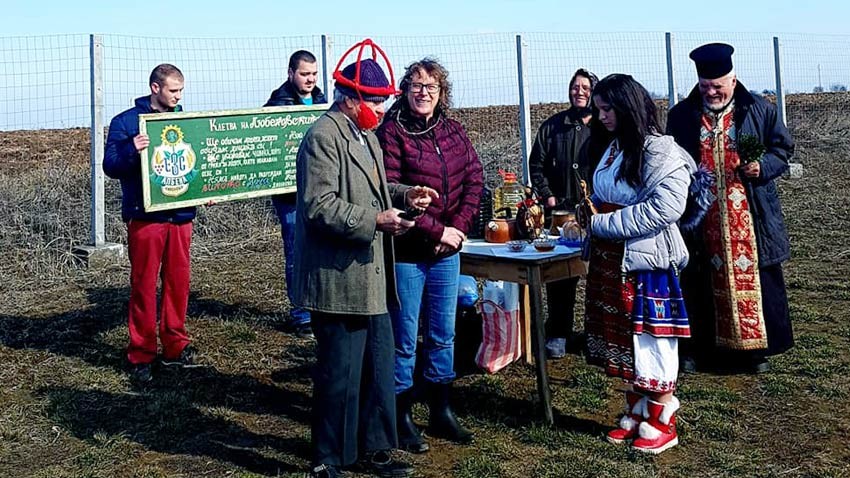Viticulture and winemaking is not reserved for men only. However, not many people are able to produce a true elixir with EU certificate for organic product, to cultivate 30 hectares of vineyards located in some of Bulgaria’s cleanest areas part of the Natura 2000 European network of protected areas and employ dozens of families in one of the most underdeveloped Bulgarian regions. Albena Simeonova is a Bulgarian entrepreneur filled with brave ideas and optimism. She was born in the town of Pernik (Southwest Bulgaria). Albena graduated from the Sofia University Saint Kliment Ohridski majoring in biology and chemistry. Later, she studied Agroecology and Environmental Management in the USA. She has been living in the Danube town of Nikopol in the past 20 years. Albena grows 29 hectares of vineyards on the land of Lubenovo village and is among the biggest wine producers in the Danube region. Albena associated the name of her wine with the Nikopol Plateau, because people follow the ancient vine-growing and wine-making traditions in this Bulgarian region. Albena cultivates land in one of the cleanest regions in Bulgaria and perhaps in Europe. Albena Simeonova was elected Chairperson of the Bulgarian Organic Products Association for her active participation in environmental projects and her efforts in protection of organic farming. The enterprising Bulgarian contends that food manufacture must be orientated towards human health and nature conservation.
 "Organic producers are still facing many difficulties in Bulgaria. However, interest in organic farming has gradually increased. Production of organic wine is not that attractive yet. The Bulgarian people want to feed their children with healthy and organic fruit and vegetables first and are not that interested that much whether the wine they drink is organic or regular. That is why the price of organic wine in this country is similar to the price of conventional wine. I do not use any pesticides, chemical fertilizers or genetically-modified organisms at all. My vineyards are located in the Nikopol Plateau, the region included entirely in the Natura 2000 European network of protected areas. My production volumes increased with another 12 hectares of vineyards. The first wine sold at the latest edition of the International Green Week in Berlin at the end of January this year was a bottle of Muscat from my winery. Although people drink mainly red wines during the winter, this white wine was among the products that attracted biggest interest at the exhibition. My rose wine was also assessed highly by sommeliers and ordinary consumers."
"Organic producers are still facing many difficulties in Bulgaria. However, interest in organic farming has gradually increased. Production of organic wine is not that attractive yet. The Bulgarian people want to feed their children with healthy and organic fruit and vegetables first and are not that interested that much whether the wine they drink is organic or regular. That is why the price of organic wine in this country is similar to the price of conventional wine. I do not use any pesticides, chemical fertilizers or genetically-modified organisms at all. My vineyards are located in the Nikopol Plateau, the region included entirely in the Natura 2000 European network of protected areas. My production volumes increased with another 12 hectares of vineyards. The first wine sold at the latest edition of the International Green Week in Berlin at the end of January this year was a bottle of Muscat from my winery. Although people drink mainly red wines during the winter, this white wine was among the products that attracted biggest interest at the exhibition. My rose wine was also assessed highly by sommeliers and ordinary consumers."

Each wine producer must know well the taste of consumers and diversify its produce, Albena contends. Her wines are mellow and light, because of their lower alcohol content. I export wine to Belgium and Denmark, but also sell my produce on the Bulgarian market, Albena Simeonova says and adds:
"Foreign consumers like my wines, because its taste differs completely from the regular wines. This is due to the high-quality of my grapes. I am among the biggest employers of seasonal workers in Nikopol region. I employ 25 people on permanent contracts, but over 80 people work in my vineyards during the vine-pruning season. I have all necessary modern machinery and equipment for vine growing which cost a lot of money. This job is not suitable for everyone. One must have huge patience and motivation, in order to succeed in this business. The good news is that people now can rely on many European programmes which finance such start-up businesses in organic farming. Most Bulgarian farmers benefit from Bulgaria’s membership in the European Union."
English version: Kostadin Atanasov
Photos: courtesy of Albena SimeonovaAccording to data from the Bulgarian National Bank, household bank loans in Bulgaria surpassed €25.5 billion mark , reaching €25.59 billion by the end of May 2025. The Bulgarian News Agency (BTA) reported that the total loan amount had increased by..
A number of institutions – the Ministry of Labor and Social Policy, the Employment Agency, the Executive Agency for Bulgarians Abroad and the Ministry of Interior, as well as members of parliament, have made a clear commitment – to..
Bulgarians working abroad sent over EUR 420 million to their relatives during the first quarter of 2025. This amount is EUR 66 million higher than in the same period of 2025. The largest sum was sent by the Bulgarian diaspora in the United States,..
With record interest, Bulgaria's Ministry of Finance has successfully placed debt on international capital markets, the institution announced. Two..
Bulgaria’s Minister of Finance Temenuzhka Petkova announced that Bulgaria is expected to meet the eurozone's price stability criterion again in June...

+359 2 9336 661
